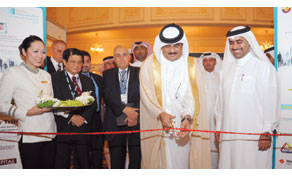 |
|
Al-Sayed cutting the ribbon to launch the summit. |
How to make cities a better place to accommodate human needs with a futuristic perspective that builds on the present potentialities was the main topic of discussion at the second annual Humanisation of Cities of Tomorrow Summit which opened in Doha yesterday.
The Ministry of Municipality and Urban Planning (MMUP), which is supporting the summit, “gives special attention to the creation and development of parks, public gardens, playgrounds, green areas and other means of entertainment, to build a strong relationship between inhabitants and their residential areas”, said Doha Municipality director Mohamed Ahmed al-Sayed.
Kahramaa president Essa bin Hilal al-Kuwari said that the company is committed to work out solutions to produce no carbon or low carbon energy to maintain a sustainable environment.
He stressed the vital need of water and electricity for the development of society indicating that consumption has been more than doubled in the recent years. “So there is an urgent need to introduce eco-friendly solutions to increase production and decrease the cost,” he added.
Transportation and modern city planning were discussed by various participants, stressing the need to design cities as multi-activity hubs to minimise the need for travel. Modern cities should incorporate schools, parks, shopping malls and
workplaces.
“We want to develop areas that we call ‘live, work and shop’. This would reduce dependency on vehicles,” said Osama Freija, senior transportation engineer at MMUP.
He pointed out that Qatar has its distinguished cultural perspective and environment, so “we are not trying to impose the experiences of other countries on Qatar but rather benefit from their experiences.”
He said that there are plans to incorporate integrated public transport solutions and have more shaded areas with innovative methods to make the journey nice for the target destination and reduce the number of vehicles on the roads.
Geoff Mee, deputy CEO at Qatar Railways Company (Rail), said that trains can be the spine of transportation in modern cities and offer comfortable and speedy solutions that could attract people out of their vehicles. “Yet, it needs to be incorporated with other means of public transport and private vehicles.”
He said that Rail would have a good bulk of potential passengers as the company is receiving requests from various businesses to have links accessible to their locations.
He also pointed out that the train system would have a massive impact on reducing traffic congestions and reduces the time of travel.
Further, with terminals reaching out to the main country ports, it would offer better freight solutions and reduce the number of trucks coming into the cities.
Mee indicated that current parking problems would drive motorists to more use of the train services.
Tareq Emtairah, senior researcher of environmental management and policy at the International Institute for Industrial Environmental Economics, said that leisure travelling and shopping account for the greatest part of vehicle use, adding: “We jump into our cars because it is the most convenient option available. Therefore, innovative city planning and public transportations should offer better options that could make people abandon their cars for a while.”
Other speakers also stressed the need to plan eco and human friendly cities that can play a major role in reducing pollution and exploiting the potentialities of the local environment to better accommodate for the inhabitants.
The two-day summit is hosting up to 150 regional and international experts from public and private sectors.

